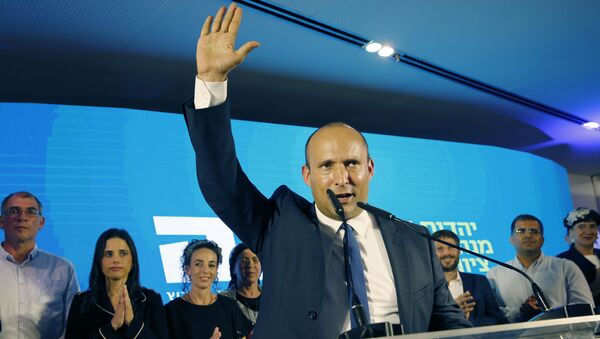Israel's security cabinet has approved the nomination of former education minister Naftali Bennett to the position of the country's defence minister, Israeli media reported on Sunday.
This comes after Interim Prime Minister Benjamin Netanyahu announced his decision on Friday night.
The move raised eyebrows in Israel, not only because of Netanyahu's decision to bypass a long waiting list of members of his own Likud party, who were after the position, but also because of Bennett's complicated relationship with his boss that included the firing of Bennett from his post as education minister and a number of spats on a series of issues, including the handling of the situation in Gaza.
But Aviv Bushinsky, a political analyst and a former media advisor for Benjamin Netanyahu, was not surprised by the move.
"Netanyahu is paranoid and as such he doesn't want to be caught off guard. He appoints people because of their loyalty, not experience. In Bennett's case, the appointment came only because Netanyahu was afraid that Bennett would join Benny Gantz," he said, referring to the ongoing efforts of the Blue and White chief to form a coalition of at least 61 members of parliament that would enable him to form a government and become the country's prime minister.
Is he the right fit?
Bushinsky, who has known Bennett for years, believes that he will be able to do a good job in this position. "He served in one of the Israel Defense Forces' elite units and saw war from up close. He is a man of good manners and great judgement," he said over the phone.
But the Israeli public doesn't seem to remember his past achievements. In the first round of the country's elections that took place in April 2019, his New Right party didn't pass the threshold leaving him outside of the Israeli parliament. His second attempt in September 2019 was more successful bringing his party 7 out of 120 seats.
His chance to shine?
Now, however, Bennett is making a come-back, vowing to work hand-in-hand with Netanyahu, putting differences aside and managing one of Israel's most important ministries with a budget of $16 billions - some 11.5 percent of the country' total budget. But Bushinsky believes it won't last long.
"He won't be remembered as a significant defence minister. Nobody takes this appointment seriously because it is an interim government and things will change. His job will be terminated either if Netanyahu forms a coalition with the Blue and White party or if there is an escalation in Gaza or up north," he said, adding that in both cases the job will be given to one of the Blue and While chiefs who have a significant military background.
That, however, doesn't seem to deter Bennett. For him it is a chance to go back to the front of Israel's political arena after a series of failures and setbacks. Even more so, it is also Bennett's chance to implement his hawkish views on a number of security challenges, including taking a hard-line in handling Hamas, promoting a death penalty for terrorists and ousting families of terrorists who committed attacks in Israel.
But for Netanyahu the goal is different. As his chances of entering a coalition government appear slim, Netanyahu seems set to prepare his next campaign - for a third round of general elections that, according to Israeli media reports, might take place in March 2020.
If this happens, the allignment with Bennett will boost Netanyahu's chances to form a government, will help him to remain the country's prime minister and above all, will let him escape legal battles.
"Netanyahu who received one seat less than Blue and White in September's elections doesn't want to repeat his past fiasco. That's why he joined forces with Bennett hoping that when the time comes he will be able to become the parliament's biggest party," he concluded.


